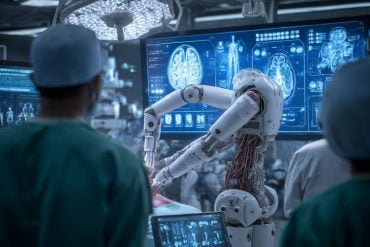Summary: Workers over 50 often benefit from better mental performance, self-confidence, psychological resilience, and a greater sense of well-being, especially if exposed to specific training sessions.
Source: University of Bonn
Am I over the hill? This question comes up regularly among workers over 50.
A common prejudice is that older people’s efficiency and stress-tolerance are continuously decreasing. But mental performance, self-confidence, psychological resilience and well-being can be improved in the 50-plus generation.
This is shown in a study by researchers from the Section of Developmental and Educational Psychology at the University of Bonn, which was published online in advance in the European Journal of Ageing. The print version is expected to be released in December.
Corporate executives are concerned that older professionals will no longer be able to keep up with technological innovations.
“In the working world, for a long time, employees were frequently offered no opportunities for further training after the age of 45,” Prof. Dr. Una Röhr-Sendlmeier of the Developmental and Educational Psychology Department at the University of Bonn reports from previous studies.
“It was assumed that such an investment would not be worthwhile.” This was contradicted by the results of research in developmental psychology, which show that lifelong learning is generally quite possible.
More than 800 participants
In the “Learning in Everyday Work” (“Lernen im Arbeitsalltag”, LiA) project, Röhr-Sendlmeier’s team studied the impact of particular training sessions on mental speed and concentration, perception of one’s own competence, self-efficacy, and stress management in more than 800 women and men aged 50-plus during the years 2013 to 2019.
“It was important to us that in each of the training sessions, the content on the different training areas was offered in a varied and interlocked way,” reports first author Tanja Hüber.
For instance, physical activation was followed by cognitive training, then skills reinforcement, and after a break, information on stress development and relaxation exercises.
The complete training course consisted of five modules administered during two and a half hours per week for 15 weeks: In the skills training, participants visualized the skills and professional strengths they have acquired over the course of their lives. Stress management training was about finding individual strategies for dealing with stressful situations.
The group trained mental abilities and problem-solving skills with the strategy game “Go”, which was largely unfamiliar to most of them. Memory strategies were part of another module. Coordination exercises for activation and relaxation exercises to gain strength in everyday life rounded off the program. The control group received no training.
While 397 participants began with the five modules, other groups focused on specific training contents combined with physical activation. “We wanted to find out what effects the cognitive training, the skills training or the stress management training each had on their own,” explains co-author Dr. Udo Käser. The individual training sessions comprised two hours per week and took place for seven weeks.
Statistically measurable improvements
Immediately after completion of the training courses and after another 6 months, the team evaluated the effects of the five-module training course and the specific trainings with questionnaires and tests.

The results show statistically highly significant improvements. For instance, participants’ information processing speed increased on average from 2.42 bits per second before training to 2.65 bits per second six months after training. In contrast, the control group changed little.
The training group’s self-assessment of inner calm also showed an increase from 4.75 before training to 5.28 on a scale of one to nine. The tendency to give up when facing failure decreased from 5.12 before training to 4.53.
A survey after participation showed that over 97 percent of participants would recommend the training to others. The team has further inquiries from companies about the “Learning in Everyday Work” project. The researchers intend to continue the project beyond the funded period. They are also invited to present their findings at the International Conference on Future of Preventive Medicine and Public Health in Barcelona, Spain, in March 2023.
A win-win for employees and companies
“Professionals over 50 gain quality of life, and companies gain the opportunity to offer these professionals a perspective for longer,” Röhr-Sendlmeier concludes. This is a win-win situation for both sides – and in view of demographic change and the shortage of skilled workers, it is also of great importance to society as a whole.
Funding:
The study was funded by the Hans Hermann Voss Foundation.
About this aging and psychology research news
Author: Johannes Seiler
Source: University of Bonn
Contact: Johannes Seiler – University of Bonn
Image: The image is in the public domain
Original Research: Open access.
“Evaluation of a multi‑component training programme for employees aged 50+” by Una Röhr-Sendlmeier et al. European Journal of Aging
Abstract
Evaluation of a multi‑component training programme for employees aged 50+
Lifelong learning offers an opportunity for mature employees to stay adept in the light of changing demands, to promote health and counteract physical and cognitive decline.
This intervention study evaluates the effects of a multi-component training programme for employees aged 50+ , focussing on competence expectations, stress management, cognitive, metacognitive and psychomotoric training.
Effects were evaluated in a longitudinal control group design with follow-up after six months (24 training groups, n = 247, participants per group: M = 13.04, SD = 2.44; control group, n = 199).
To control for experimenter effects the same programme was administered to 6 additional groups by trained instructors (n = 54, participants per group: M = 11.83, SD = 3.37).
To validate effects of the multi-component training 12 supplementary groups were included, with 4 groups each focusing on either the competence (n = 49, participants per group: M = 15.00, SD = 0.00) or cognitive (n = 43, participants per group: M = 14.25, SD = 1.50) or stress management components (n = 41, participants per group: M = 14.50, SD = 0.58).
Data of 633 adults (mean age: M = 55.03, SD = 3.71 years) were analysed. Participants reported high acceptance of the programme.
The multi-component training programme was effective regarding improvements in subjective health, self-concept of professional competence, self-efficacy, coping with stress and cognitive abilities with long-term effects for the latter four. Trainings administered by trained instructors had similar effects to those administered by the programme’s designers.
The single-component trainings led to specific effects in the focused areas, overall comparable to those of the multi-component training. Unexpectedly, cognitive effects were obtained by all single-component trainings. Subjective health and self-efficacy were only promoted by the multi-component training, indicating broader effects.
The results are discussed with respect to strengths and limitations of the study, possible mechanisms underlying the effects, suggestions for further research as well as for the training’s implementation in business practice.






